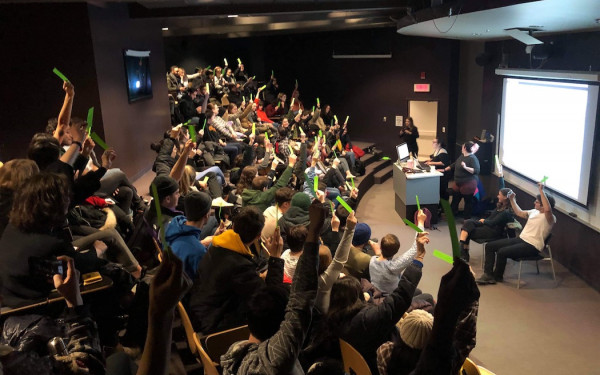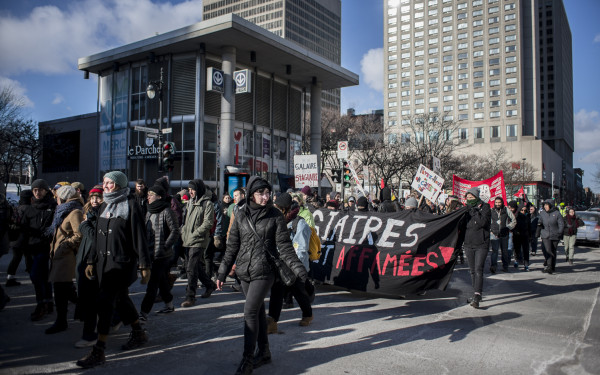Students in Montreal protest against unpaid internships
Interns ask to be compensated for their work amid cost-of-living crisis
On March 29, around 70 students and people supporting the cause gathered at Place Émilie-Gamelin in Montreal to rally against unpaid internships. The protest was organized by Coalition de résistance pour l’unité étudiante syndicale (CRUES), a student union that regroups different student associations across Quebec representing 35,000 students.
Protesters marched to the education ministry on 600 Fullum St. to demand all internships be fairly compensated. Signs condemned unpaid work, gender-based injustice, and chants demanded the Quebec Minister of Higher Education, Pascale Déry, resign.
“We are in a cost-of-living crisis here in Quebec,” said Angelica Antonakopoulos, the academic coordinator of the Arts and Science Federation of Associations at Concordia University. “Rent is unaffordable… To tell students that in order to gain experience, they have to work for free is incredibly unfair… We’re here, we have the right to be paid for our labour.”
According to a report by Centraide from 2023, nearly one in five households in Greater Montreal does not make enough money to afford essential needs such as food and clothing. The Canada Mortgage and Housing Corporation reports that, as of January 2024, rents in Montreal have risen by 7.7 per cent--the largest increase in 30 years.
Clémentine, a protester who wished to withhold her last name for privacy concerns, said interns’ responsibilities have changed a lot over the last ten years.
“Internships have become a lot more demanding for students,… and we want all of them to be compensated fairly and equitably,” she said.
This protest comes on the heels of Déry’s decision to not make internships in the public sector remunerated due to budgeting issues.
Speakers and attendees said that this refusal is indicative of the larger issue of wage disparity between men and women. They claimed that most unpaid internships to fulfill degree requirements are found in female-dominated sectors such as nursing and teaching. Some chants for this protest called out the fact that the message this sends to women is to “stay in the kitchen, have kids, and keep [their] mouths shut.”
According to a study by the Institut de recherche et d’informations socioéconomiques (IRIS), over 120,000 collegiate and university students are interns annually. Most of these internships are unpaid and are found in predominantly feminine fields, such as health and biology sciences.
Clémentine highlighted that this salary gap poses a significant obstacle to people from marginalized communities.
“We often notice that [unpaid internships] are in traditionally feminine careers in the public sector,” said Clémentine. “They are careers where there are a lot of people from marginalized communities, and the fact that we are not compensated means that we can’t always pay rent or afford food. This discourages a lot of people unfortunately.”
Antonakopoulos says students have been fighting for paid internships for a long time, and protesting gives visibility to the cause. Clémentine agrees, stating that “many people don’t even know that we’re not being paid, and they’re shocked when they find out.”
Protesters also demanded that the government provide more paid internship opportunities rather than focusing on initiatives like the “comité des sages.” This committee has been created by the Minister of Families Suzanne Roy to advise the government on questions related to gender identity. Protesters claimed it would be more beneficial to put more funding into the public sector to be able to remunerate all interns, than the committee.






